CRUEL INTENTIONS (1999)
Two vicious step-siblings of an elite Manhattan prep school make a wager: to deflower the new headmaster's daughter before the start of term.
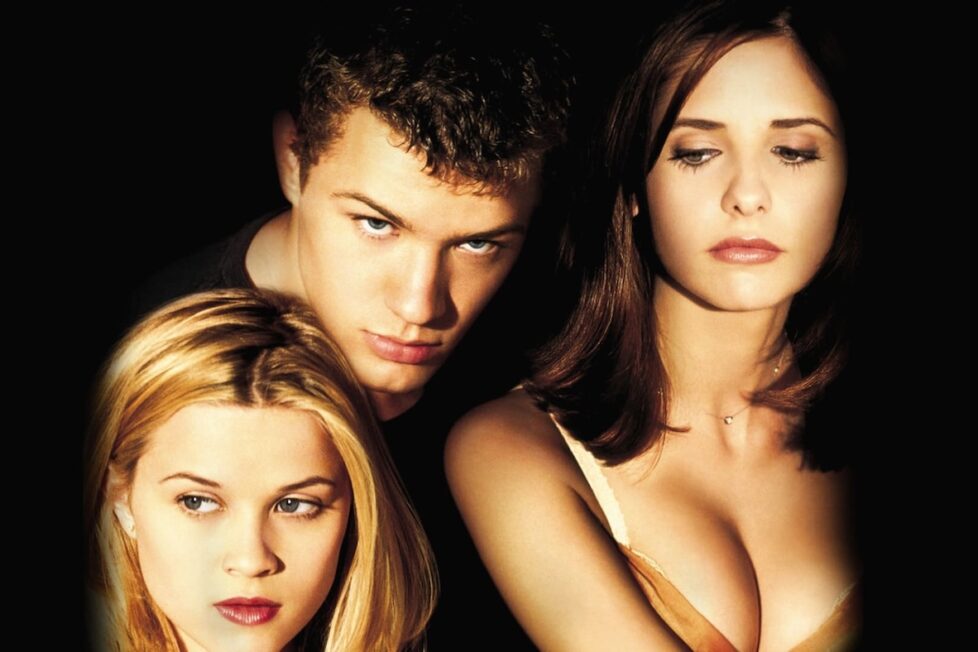
Two vicious step-siblings of an elite Manhattan prep school make a wager: to deflower the new headmaster's daughter before the start of term.


Placebo. Ryan Phillippe. The raunchy teen comedy. You can still find them around today. But Cruel Intentions is a bittersweet symphony of 1990s nostalgia. Bittersweet because of the stinging irreverence in the writing and directing of Roger Kumble. “Da bomb” ’90s youth culture is all but dead, making way for the glib egoism of the new millennium.
Teen-driven comedies and horrors boomed in the 1980s, and a decade later, both genres were hurtling inevitably towards the same societal Y2K. Jawbreaker, Drop Dead Gorgeous, Teaching Mrs. Tingle, Idle Hands, and yes, Cruel Intentions, all came out in 1999 and centred around teen deaths. Actual horrors like Scream (1996), The Faculty (1998), and Disturbing Behavior (1998) feel positively quaint. Like his contemporaries, Kumble doesn’t ask ‘how do you do, fellow kids?’ so much as ‘are you kids alright?’
Sebastian (Phillippe) presents himself as a sullen and directionless teenager. His therapist notes ‘verging on pyshopathic [sic]’ just above her reminder to bill him for the complimentary self-help book. Empathy seems all but dead at the turn of the 20th-century. That belief is why Sebastian and his step-sister Kathryn (Sarah Michelle Gellar) have such cruel intentions towards everyone they meet. Sebastian isn’t interested in pop psychology. His warped self-actualisation has led him to enjoy the fallout of his latest conquest.
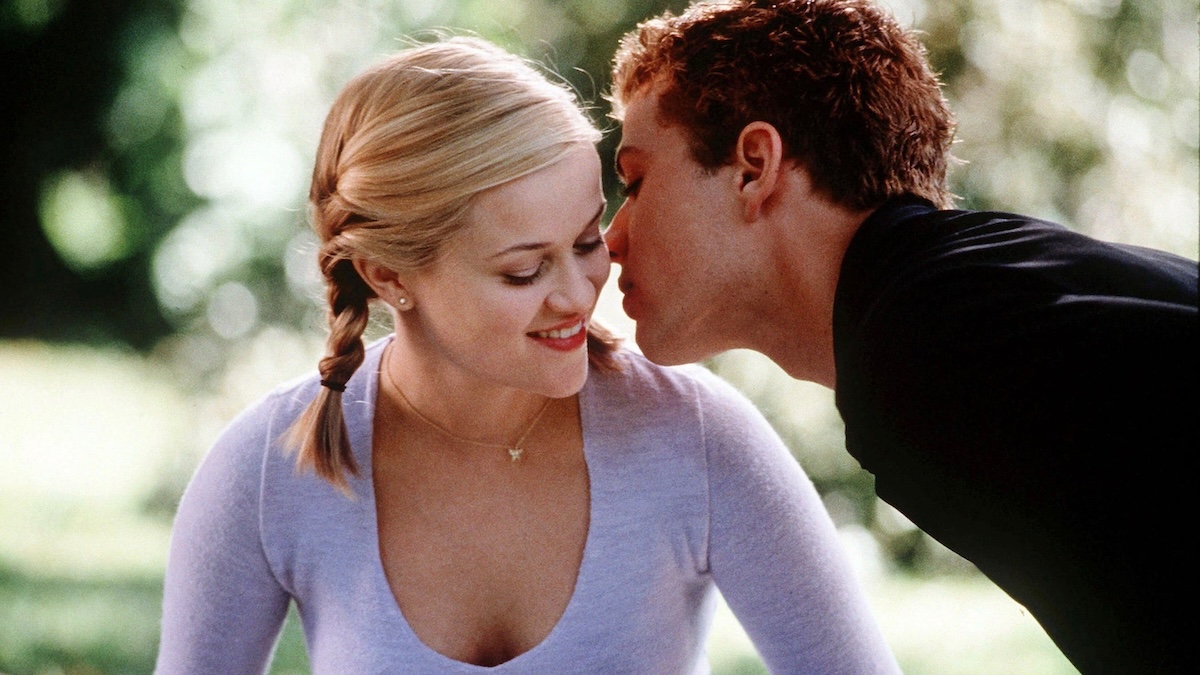
The therapist’s daughter (Tara Reid) wails over the phone after her nude photos leak online. A humiliating, nasty, horrendous act. And yet, the robotic website repeating “you. are. a. slut.” is wickedly funny. She screams “cut the psycho babble bullshit, mom!” and her reveal that Sebastian did it sends the cold professional into a blustering f-bomb rage. Sebastian walks away smiling, already wooing the next naïve young woman. This is our opening sequence, and our protagonist is an absolute bastard.
Like Patrick Bateman praising Huey Lewis and the News before a murder in American Psycho (2000), the hip superficiality is very much on the nose. Cruel Intentions takes a satirical swipe at its source material by twisting the sex comedy genre to expose the monstrous behaviour of its horny teenage protagonists.
The opening credits, which read “suggested by the novel Les Liaisons dangereuses,” feature Brian Malko whining “Every You, Every Me.” Understanding Pierre Choderlos de Laclos’ 1782 novel informs the film’s brazen eccentricity. The French nobility in the novel share the same pompous austerity as the students at their Ivy League American counterparts. The epistolary form of the novel offered a subjective perspective of these characters shaking free from the stifling weight of traditional values. In their attempt to buck social norms, they become morally unmoored themselves.
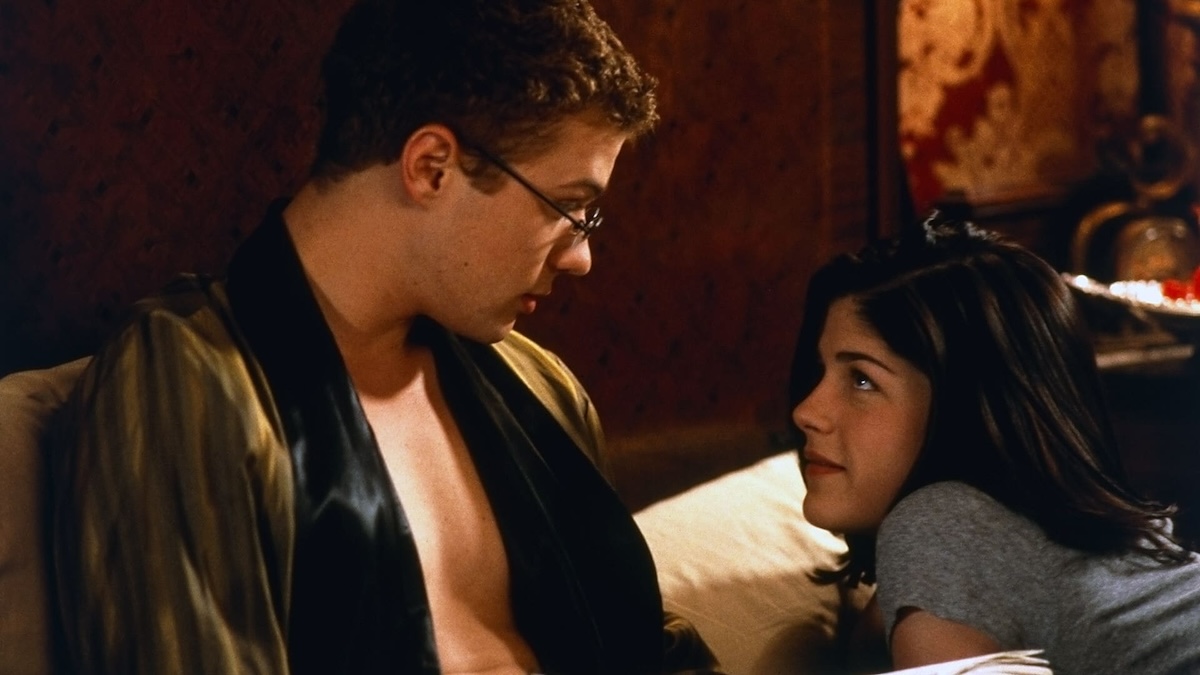
Our two protagonists live life to the full by antagonising others. Sebastian, however, grows “sick of sleeping with these insipid Manhattan debutantes; nothing shocks them anymore.” The ever-greater highs of debauchery are wearing thin, and they are now reticent about each other’s latest pursuits. Defiling the new headmaster’s uppity daughter before school starts and ruining the reputation of Kathryn’s exes’ new girlfriend are hardly worth the effort. Wikipedia lists this as a romantic drama, which is utterly absurd. Aside from perhaps the saccharine 10-minutes of the last act, Cruel Intentions is a pitch-black comedy when one of the major romantic gestures involves step-siblings betting with the prize of “you can put it anywhere.”
When Sebastian pursues his target, Annette (Reese Witherspoon), he recognises that she can’t be wooed so easily. So he ups his game and immediately dismantles her published thesis, in which she doesn’t think “people our age are mature enough to experience those emotions.” Though set up as his foil and a decent human being, her goody-two-shoes mentality still infantilises young adults by suggesting they aren’t capable of complex sentiments. Sebastian becomes the embodiment of ‘the worst person you know who just made a great point’.
A film about the worst people needs charismatic actors to pull off this acerbic wit, and Cruel Intentions features a memorable cast. Sarah Michelle Gellar was currently filming the third season of Buffy the Vampire Slayer (1997-2003) and had already worked with Phillippe on I Know What You Did Last Summer (1997). In each role, Gellar eagerly explored any range outside of the blonde cheerleader archetype. She near enough hunted down Kumble to get this role despite her agent’s protests. Her palpable enthusiasm translates into Kathryn relishing every pointed snipe and shift to be the meanest bitch in the room.
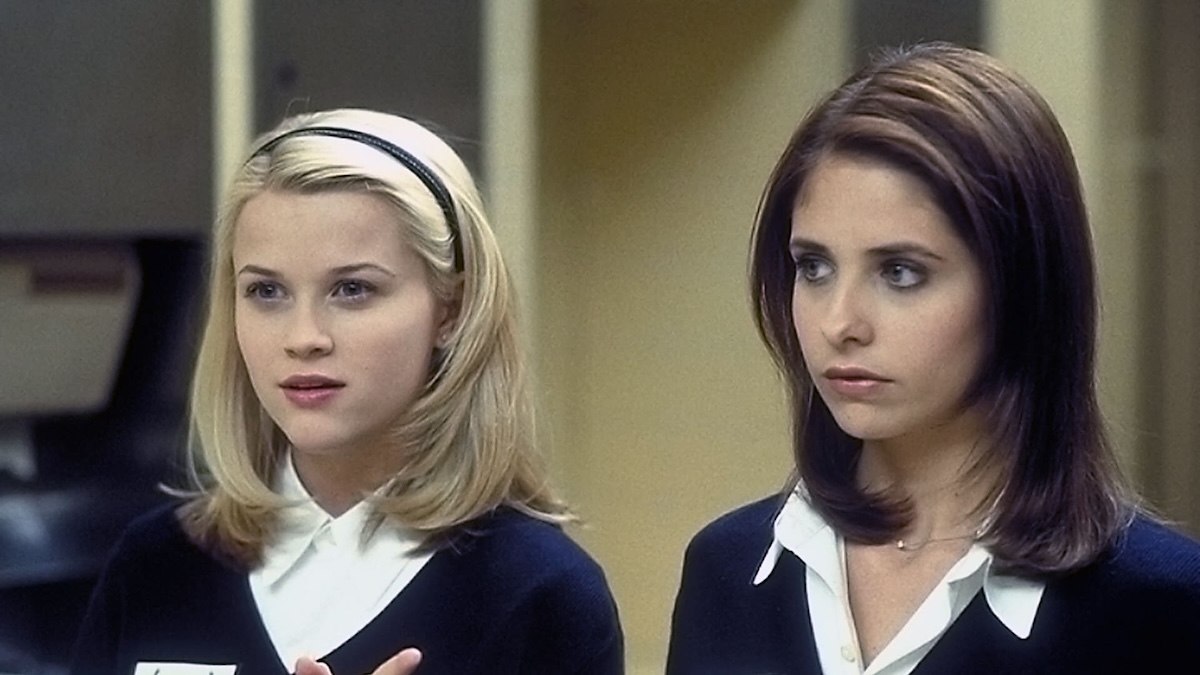
At this time, Witherspoon was no stranger to playing opposite terrible people. Starring as similarly positive foils in American Psycho and Election (1999), her genuine intelligence elevated all three roles. As Kumble praises, “there’s no way the movie would have been successful if it weren’t for Reese’s talent as a writer.” It’s surprising to hear that after finding Annette “too demure,” the role was considered “too much of a woman influenced by a guy’s manipulations,” when that is absolutely not what Annette is in the final film.
Perhaps, then, not every character was fully fleshed out. Selma Blair delivers an enthralling, if bewildering, performance that makes us question whether we’re as bad as the leads for laughing at her. Cecile is the sheltered new girl who just happens to be the replacement girlfriend after Kathryn, and she must be destroyed. In previous adaptations of this character, Uma Thurman was 18 in Dangerous Liaisons (1988) and Fairuza Balk was only 15 in Valmont (1989). Selma Blair was 27 when she played a high school girl, and she portrays her in such a childish way that I can never quite tell if she’s meant to be mentally challenged.
All these characters, Phillippe’s most especially, share a performative similarity with Christian Bale’s Patrick Bateman. As he puts it “there is no real me: only an entity, something illusory […] I simply am not there.” Kathryn bemoans “Do you think I relish the fact that I have to act like Mary Sunshine 24/7 so I can be considered a lady? I’m the Marcia fucking Brady of the Upper East Side and sometimes I want to kill myself.” Horror comes from these sociopaths wearing the masks of sociable people, comedy comes from how insincere those masks are. Their public personas are a pantomime.
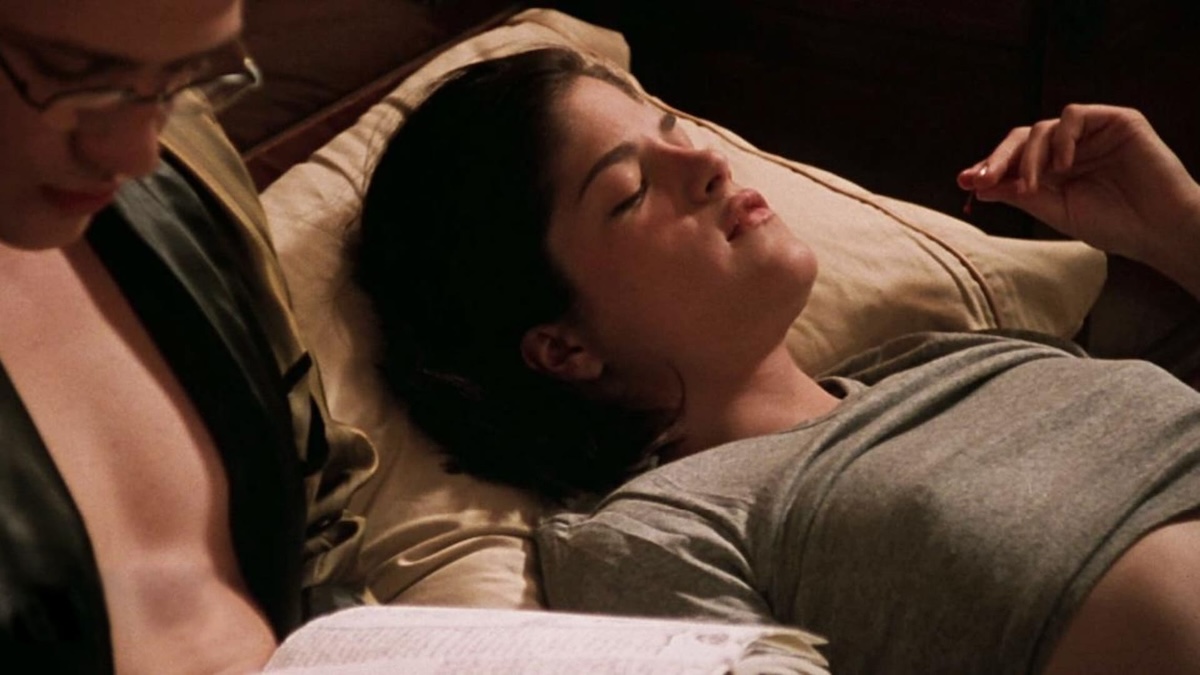
When the characters do act like their true selves, the sexual politics become very much of the period. Every chic ’90s slur for sexual transgressions is thrown around flippantly. Even when Sebastian is with his gay friend (Joshua Jackson), he calls someone a “fag, no offence.” Our two leads, Bateman and even the Marquis de Sade, are still confined by their own heterosexuality. One might think they would engage wholeheartedly in every ‘perversion’ that traditionalists campaign against. And yet, Sebastian and Kathryn are more interested in flirtation that verges on incest than sex with the same gender.
They do demonstrate a millennial progressiveness: Sebastian’s open sex talks with his confidante, and of course, the first base encounter between Geller and Blair. This iconic scene not only earned them the 2000 MTV Award for ‘Best Kiss’ but also the 2020 MTV Award for ‘Legendary Lip Lock’. Kathryn may not have been enthusiastic about continuing it, but the two actresses have recreated this kiss several times over the years, solidifying their cult status.
Not all their deviant acts are so entertaining. Kumble rides a perilous line in conveying the distinction between the amorality of the characters and the film. Sebastian going down on Cecile ends the scene with a laugh but there’s no seduction happening, he flat-out blackmails her with nude photos in exchange for sex. Even worse, somehow, is when Cecile confides her uncertainty over what happened with Kathryn, she’s maliciously gaslit into believing it was her choice to be coerced and that she should proud to have had her first orgasm. Years later, the three stars commented on it together:
Phillippe: At that age, it didn’t feel as lascivious. I’m not sure I saw it the same way you would see it in retrospect.
Gellar: What they’re doing to her is horrible. We could never make that scene today, let’s put it that way.
Blair: But Cecile enjoyed almost every moment of it! She was so odd. [laughs] She wasn’t a shrinking violet. She wasn’t upset. She was almost delusional, for the better.
EW’s Cruel Intentions cast oral history
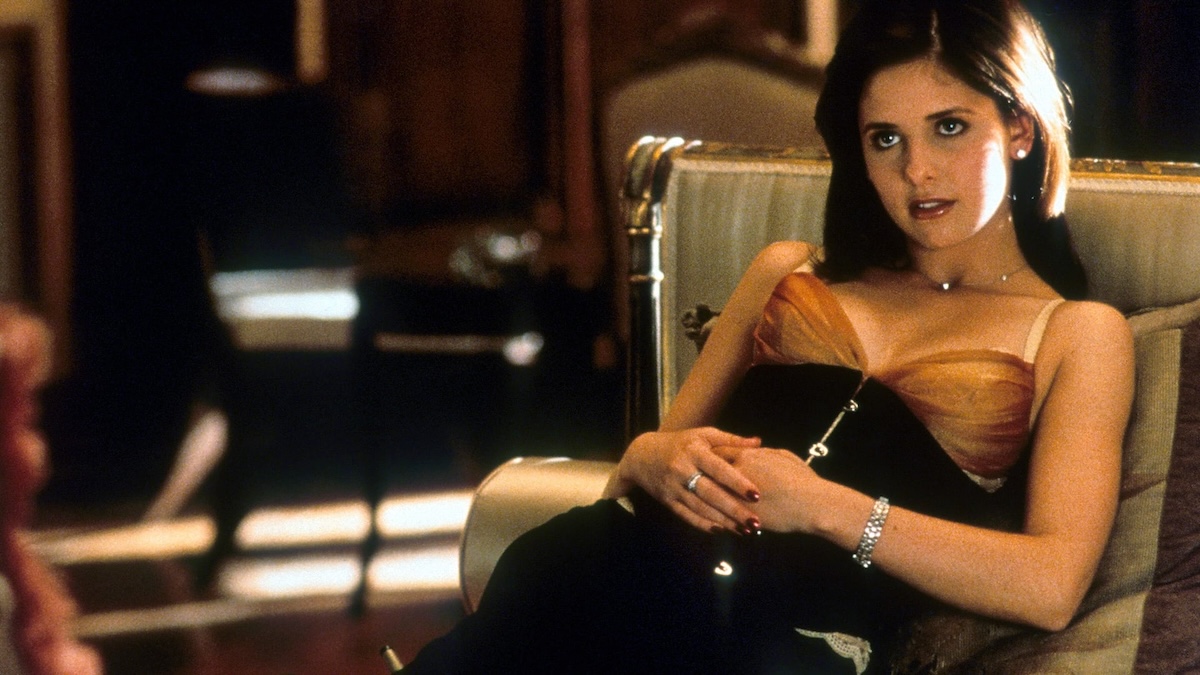
These rich kids have all the privilege in the world, and yet they still struggle to keep this rampant libertine game going. The innocence of Annette and Cecile is a confounding mystery to them. Annette confesses that charity work can be boring, and Cecile enjoys her newfound sexual liberation, but neither of them ever slides into full-on depravity. They can have ‘imperfections’ and still be good people.
Sebastian and Kathryn both let their masks slip to show their vulnerability, which to them is having human emotions. Sebastian’s is far clearer in falling in love but in doing so evidently hurts Kathryn. Her admission of “what happened to us? You don’t love me anymore” is a revelation to both as this was never more than lust until now.
“Movies have to fit in a box,” Kumble admitted. “You don’t know where to put Cruel Intentions on the aisle”. Perhaps this startling boldness comes from his successful stage plays, or the fact that this was his very first screenplay. Written in 1998, it was given the green light and produced for a release the following year. Films like this are a relic of a time when a studio wouldn’t sandpaper down every edge of a script with screen tests and executive notes. Kumble was even granted the honour of being a debut director! Cruel Intentions is thoroughly his voice: irreverent, degenerate, and as authentic as any great Aristocrats joke.
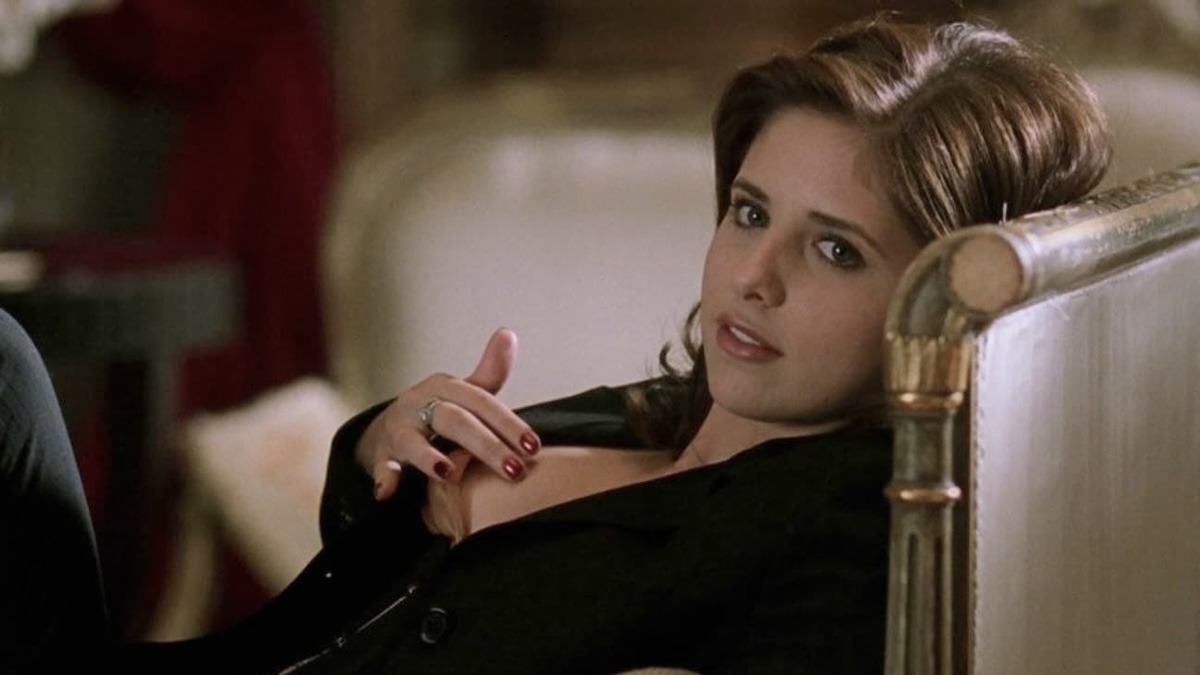
Authenticity doesn’t guarantee cohesion; there are times when maintaining belief becomes strained. The intricate, Machiavellian web of their schemes unravels if any of the ensemble victims were to explain that their actions were encouraged by the two leads. Missing from this ensemble are the two current partners that Annette and Cecile respectively have, who are barely mentioned and therefore never pose an obstacle. Then there’s the simple fact that Kathryn is seeking to destroy Cecile, but her ruination might not affect her ex-boyfriend in the slightest. That’s precisely the point of her plan.
Certain other threads are underrepresented. One such example is the token inclusion of Ronald (Sean Patrick Thomas) as Cecile’s cello teacher and secret love interest. The response to a pre-Juilliard black man writing an opera about Martin Luther King being the airy “Dr King is my favourite!” should be ranked alongside the “third-term Obama” line in Get Out (2017). Thomas has some very funny scenes. However, after his dismissal by Cecile’s racist mother, he essentially disappears until he’s needed again for the haphazard climax. Then, just as quickly, he’s absent from the resolution, as Ronald exclaims, “the black man is gone!”
The third act, as a whole, divided critics. Those who enjoyed the satirical skewering of teen romantic dramas were left disappointed by the mawkish turn. Kumble stumbles in adapting Sebastian’s comeuppance to his modern setting. In doing so, he seems to cave in to the frequent accusations levelled at Scorsese or Tarantino of glorifying wanton behaviour, and resolves all consequences in a neat, moral package. Wayland Young wrote of Laclos’ novel portraying “a sort of celebration, or at least a neutral statement, of libertinism” where “the mere analysis of libertinism was enough to condemn it.” Despite retelling the same story, Kumble betrays this neutrality, which neuters Sebastian’s journey.
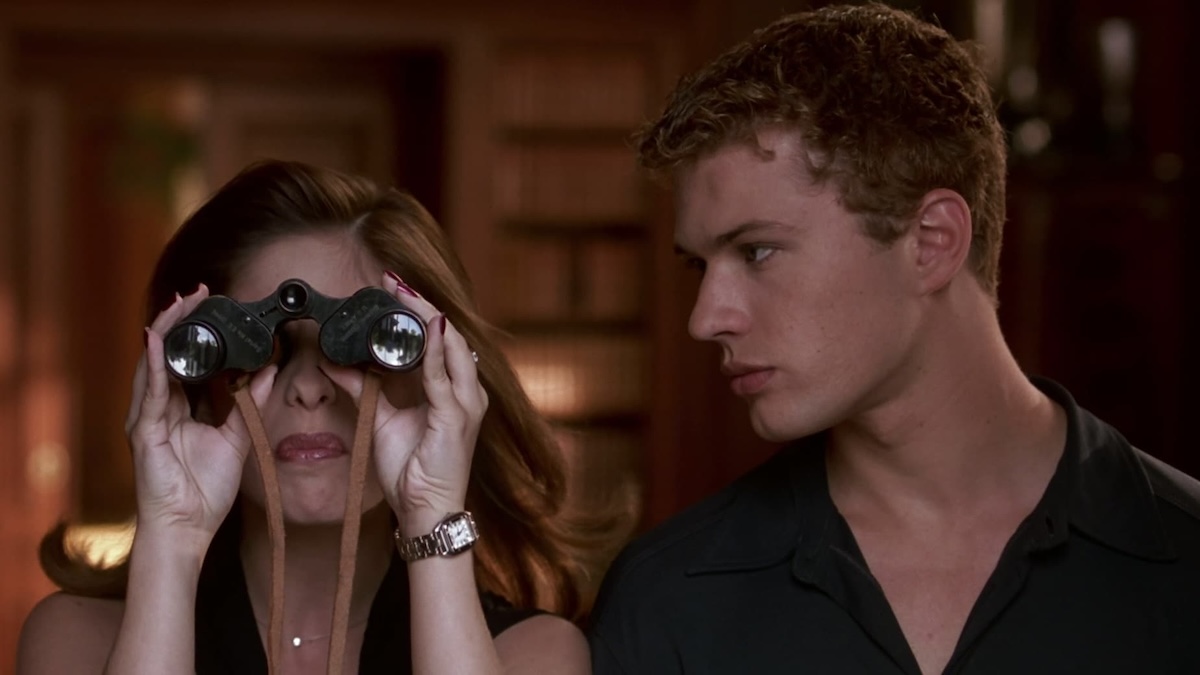
Having said that, “Bitter Sweet Symphony” blows all that out the water. Incredible needle drop for the very ending, and Kumble absolutely fought for it. Nearly $1M of the $10M production budget went into securing this timeless finish. Turns out The Verve sampled the Rolling Stones, so one song cost a tenth of the entire budget.
The more accurate adaptation of Christopher Hampton’s 1985 play, Dangerous Liaisons, won seven Academy Awards and grossed $35M on a $14M budget. Cruel Intentions went on to earn $80M and won several MTV, Teen Choice, and Blockbuster awards. The similar endings, both taken from the book, are quite conclusive. And yet, here began the Cruel Intentions Cinematic Universe…
Manchester Prep was a 13-part prequel series written and executive produced by Kumble and cancelled before it even aired in 1999. Other executives were uncomfortable with “the themes of sexuality and incest”, having apparently never watched Cruel Intentions. Rupert Murdoch, head of Fox, saw a news story previewing his new show in which a young woman was sexually aroused by a horse cock. The two completed episodes were stitched together to form Cruel Intentions 2, starring Amy Adams. If she’s the one aroused by horse cock, I never saw it.
Cruel Intentions 3 went direct-to-video in 2004. Some other guy made it. Cruel Intentions: The ‘90s Musical was a 2015 live jukebox musical written by Kumble, Lindsey Rosin, and Jordan Ross. Reviews were positive and Gellar was nice enough to record a pre-show announcement in the cutting spirit of Kathryn, warning people who “take a photo or video and bring it home to bum fuck nowhere, well guess what—that’s not permitted.”
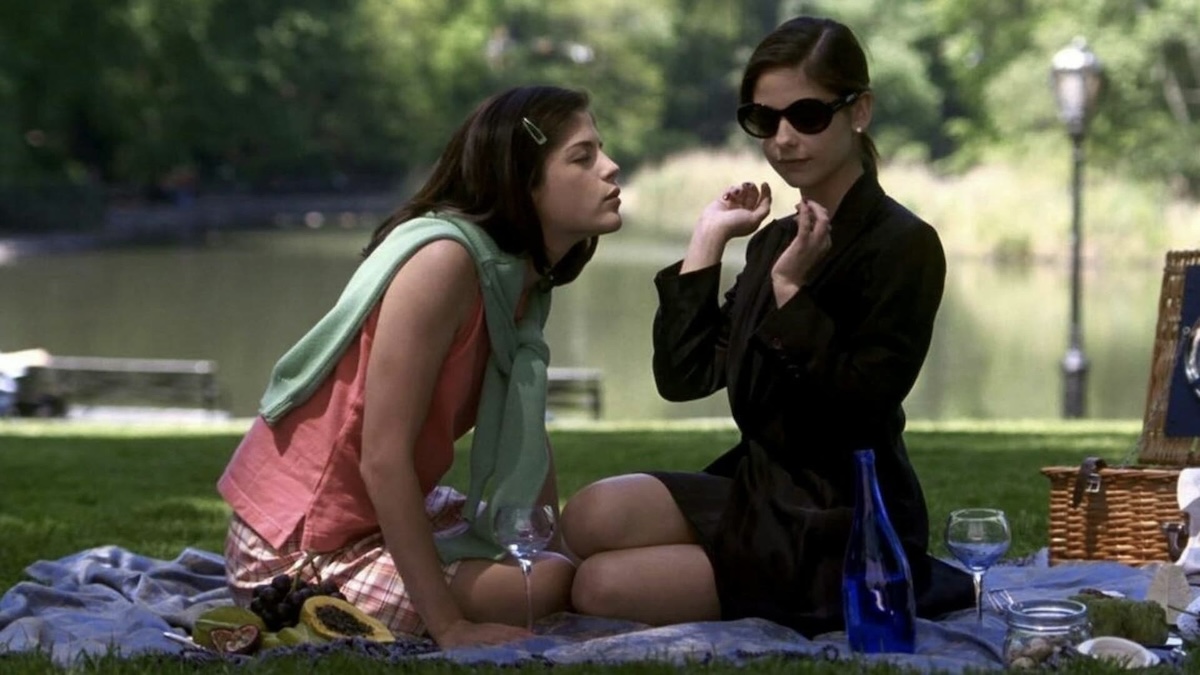
Buoyed by the success of that, Kumble wrote, directed, and produced another television pilot for NBC in 2017. It was a sequel that served as a legacy project, featuring a returning Sarah Michelle Gellar as a rehabilitated Kathryn wresting control of Valmont International from her nephew, the posthumous son of Sebastian and Annette.
The pilot wasn’t picked up and never even aired as a television movie. It’s a rare find, but it is out there. Gellar explained her decision to abandon the project, saying: “Cruel Intentions is straight streaming. On the first day, I was like, ‘This isn’t working. It’s just not a network show. And if it’s a network show, it’s not my Cruel Intentions.'”
This is a cult classic, as Gellar would say. It’s our Cruel Intentions. A friend called this camp, and it does share that delicious perversity with John Waters’ films, though teenagers in love with Ryan Phillippe might not be quite ready for Divine. Much like Waters’ work, this is an aggressive response from Kumble to the strange trend of 90s teen comedies adapting classic texts. Clueless (1995), 10 Things I Hate About You (1999), and She’s All That (1999) are all far softer films than this. But they all share the same attitude that classic literature is nothing more than kitsch. This rich and established historical culture is considered banal. What George Bernard Shaw and Jane Austen were missing was prom and Counting Crows.
Roger Ebert hit the nail on the head regarding this film’s significance: “It’s refreshing, after the sponge-brained teenage romances of recent months, to see the movie reflecting that cynicism.” It’s ironic that these films are proving that the old stories still work when presented to teenagers who wouldn’t dream of reading them. The clash of high and low culture is precisely what defines camp.
Cruel Intentions is the welcome antithesis that says the kids are decidedly not alright. Maybe they’ll figure it out, maybe they’ll destroy each other, and maybe that’s alright.
USA | 1999 | 97 MINUTES | 1.85:1 | COLOUR | ENGLISH • VIETNAMESE • FRENCH

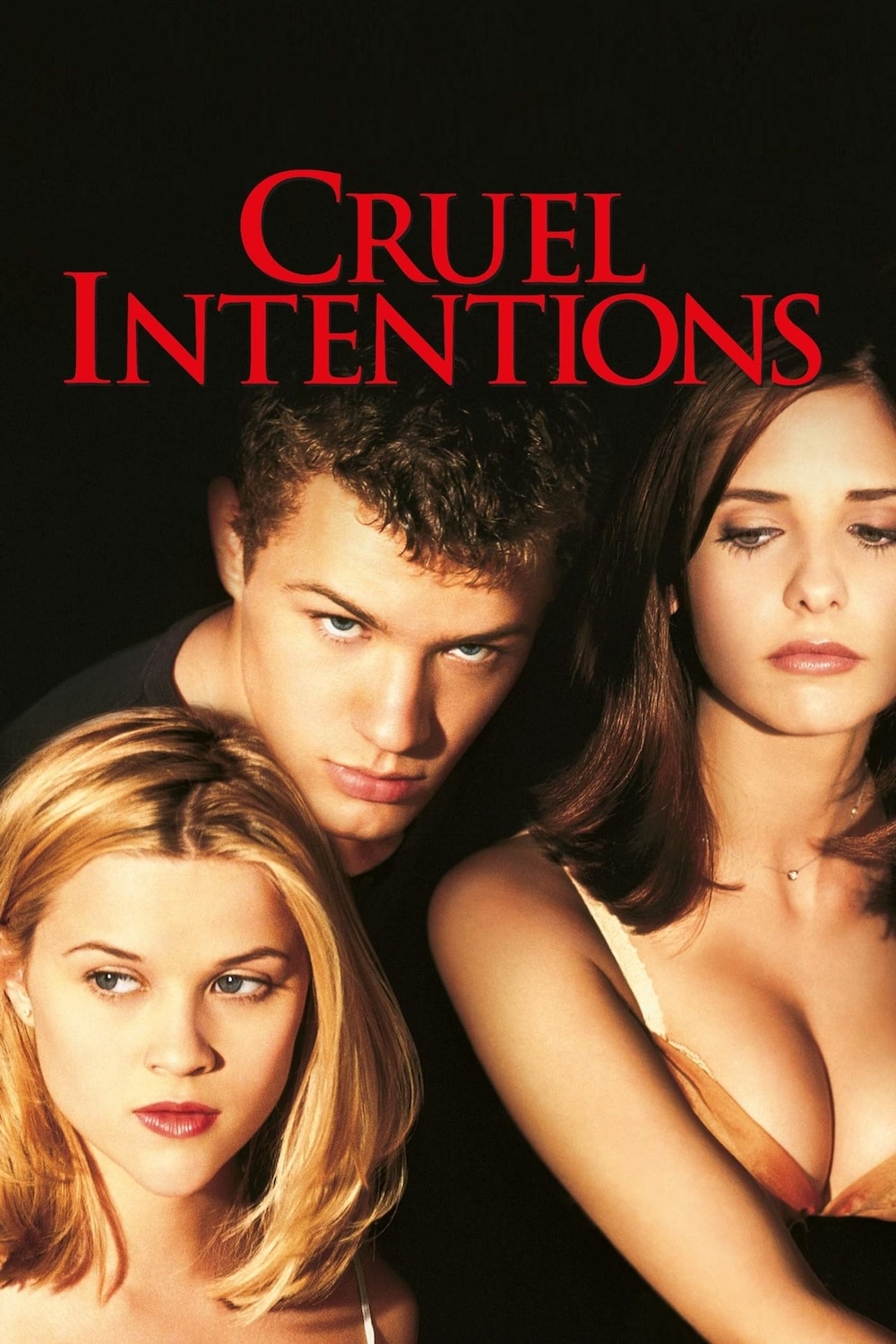
director: Roger Kumble.
writer: Roger Kumble (based on ‘Les Liaisons dangereuses’ by Pierre Choderlos de Laclos).
starring: Sarah Michelle Gellar, Ryan Phillippe, Reese Witherspoon, Selma Blair, Louise Fletcher, Joshua Jackson, Eric Mabius, Sean Patrick Thomas, Swoosie Kurtz & Christine Baranski.
